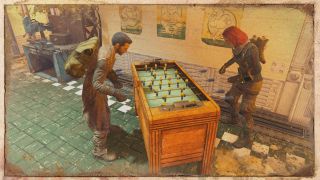How to have a good time with Fallout 76 in 2024 (or technically speaking, the year 2105)
If you’re thinking of leaving that vault, it helps to know what you’re stepping into.
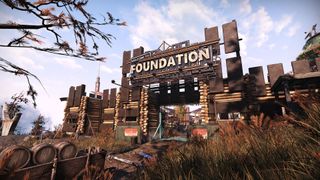
As Fallout fans we’ve lived through numerous Reclamation Days. But with the launch of the TV show on Amazon Prime, this might be the busiest yet. New dwellers are flooding out of their vaults, and you may well be among them—warily eyeing 2018's online multiplayer Fallout 76, wondering whether the kind of Fallout you like is hiding in its cranberry bogs and toxic valleys.
Here’s my guide to what Fallout 76 is and isn’t—and some advice for getting the most out of the Appalachian wasteland, from somebody who knows it like their backyard after half a decade of survival on the surface. To quote the great Mr. Goggins: I’m you, sweetie. You just give it a little time.
Fallout 76 isn't the game it was at launch
Fallout 76 was a disappointment at release, rife with bugs and missing the colorful NPCs that normally give the Wasteland life. "When that game launched, the litany of issues we had, we let a lot of people down, and, well, there was very little we didn't screw up honestly," Bethesda's Todd Howard reflected later. But things got better: NPCs arrived in the 2020 Wastelanders expansion, and since then Bethesda has continued building on the game, with all of its updates releasing for free. Here are the most significant additions to Fallout 76 since 2018:
- Major NPC settlements in the style of Diamond City and Megaton
- Relationships with factions who have their own agendas and rivalries
- Story-driven questlines involving Vault-Tec and the Brotherhood of Steel
- Expeditions to The Pitt for raids in Fallout 3’s old stomping ground
- Player-owned underground Shelters where the most ambitious building projects live
- An entire off-map hub in Atlantic City, replete with chatty mobsters and musicians
When you log onto a Fallout 76 server today, you’ll be sharing your instance of Appalachia with—at most—two dozen other players. It’s few enough for you to indulge in the lonely exploration of solo Fallout as often as you like, while having the option to visit one of the fancy encampments dotted about the map if you need a break from your questlog.
Loosen up
Survival games might have taught you to shoot first, loot later, and ask questions never. But Fallout 76 is different: it's not only a mechanically gentle survival experience, but one with an actively welcoming community.
Instead of reaching for your 10mm when you come across another human player, hit the wave emote instead. If you let them, high level players will shower you with purified water and surplus ammo. They’ll feel good about helping out a goofily gesticulating newcomer in a blue jumpsuit, and you’ll have plenty to drink.
Once you’ve laid down a C.A.M.P., the same attitude applies. Rather than constructing your base like a fortress, full of locked doors and laser turrets, it’ll behoove you to build a comfortable homestead and open your doors wide. Visitors tend to come correct, looking to admire your handiwork, or to buy guns and recipes from your vending machine—a helpful passive supply of caps.
PC Gamer Newsletter
Sign up to get the best content of the week, and great gaming deals, as picked by the editors.
Don’t sweat your build too much
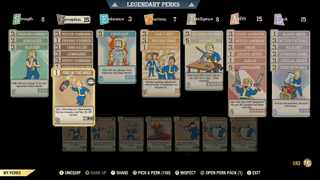
Fallout 76 has a flexible Perk system built on cards that you can swap in and out at will. That might sound like an affront to Fallout’s tradition of meaningful decision-making, but when it comes to an MMO that could become part of your life for years, it’s the right choice. There’s no way to muck up your character forever by investing too heavily in cannibalism or damage against insects.
When you reach the high levels and start to hit a ceiling, it makes sense to rejig your Perks situationally—swapping in Gun Nut and Armorer only when you’re peacefully parked at the workbench, or keeping your Hacking skills in the back pocket for a rainy computer day. You can even redistribute your S.P.E.C.I.A.L. points to create alt-loadouts, easily accessible between quests. The possibilities will give you plenty of reasons to keep leveling and experimenting even beyond level 50. One day, that rad-boosted Ghoulish build will be mine.
Mix and match your quests

Fallout 76 infamously launched as a kind of open world System Shock, with every former resident of Appalachia dead or long gone. Understandably that proved a little too hollow and downbeat for many players, and Bethesda have since transformed West Virginia into a full-fledged Fallout game, flush with multiple NPC hubs and conversation-driven stories.
The original questlines now exist in the background. But rather than ignore them, you’re better off engaging in a balanced diet of missions, swapping between zippy new adventures in Atlantic City and more slow-burn exploration of West Virginia’s ruins. It’s like they say: fresh Brahmin steak tastes best when followed by a bowl of expired Sugar Bombs.
Seek out the original Overseer caches, now relegated to side quests, and you’ll discover they’re hotspots for holotapes. These areas of the map are where Bethesda’s environmental storytelling is at its thickest and most satisfying. It’s there you’ll discover the richness baked into Fallout 76’s map: the elite ski resort where the 1% resorted to raiding rather than picking up a spade, and the training camp where the Brotherhood of Steel first adopted their quasi-religious overtones.
The history and worldbuilding buried just beneath the surface of Appalachia is one of Fallout 76’s great strengths over comparable MMOs and survival games, and you’d be surprised how much it can deepen your connection to its land and people.
Know what Fallout 76 can't give you
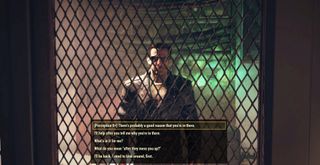
The promise of an online Fallout doesn’t come without compromise, even now. Fallout 76 doesn't have the simulated world that has ticked along under the hood of Bethesda RPGs for decades. Since NPCs need to be readily available for every player that might come along, not just you, they can’t be turned hostile. That means you’re free to swipe those Mentats off a questgiver’s desk without consequence. And no matter your Sneak stat, you can’t rifle through their pockets, nor stuff those same pockets with dynamite and run for the door. All of which will inevitably dismay some longtime players who reserve the right to abruptly end their relationship with a faction via theft or murder.
There are ways in which Fallout 76’s more traditional RPG adventures come into conflict with co-op, too. In the newer dialogue-driven questlines, additional players take a backseat. Either you’ll have to enter key instances separately, or accept that only one of you will be doing the talking and get to strike the finished mission from your questlog.
It’s a drawback I asked Bethesda about recently and confirmed is a deliberate design decision rather than a technical restriction. The idea is that the team leader alone should have agency to steer the direction of their own quests so that they don’t wind up living with the consequences of choices made by their teammates. The logic checks out, but it’s a frustration nonetheless—and one you’ll need to accept if you’re to get on with 76.
Make the most of what you’re gaining

Unless they’re packing a Stealth Boy or some other form of cloaking, every player is immediately visible on Fallout 76’s map when you log in. Don’t be afraid to make a beeline for them, and to embrace the emergence that happens when two players cross each others’ singleplayer questlines. Temporary team-ups can be useful and fun—particularly when the other player's mute, leaving you room to project motivations onto your fellow traveller. A stranger might well lead you to parts of the state you’d never discover on your own. Think of them like Boone in New Vegas: a companion who doesn’t talk much but is handy with a rifle.

Fallout 3
Essential Fallout 3 mods
Fallout: New Vegas
Best Fallout: New Vegas mods
Fallout 4
The best Fallout 4 mods
Sim Settlements mods for Fallout 4
If you spot a golden hexagon on the world map, that’s an unfolding Event—a brief and silly group quest in which you’ll be fending off Gulpers, conducting Mothman rituals or playing musical instruments as a band to attract a green-glowing cryptid. These are both a strong source of XP and legendary loot, and an easy way to punctuate your solo escapades with bursts of low-commitment co-op.
Then there’s PvP—for the vast majority of players a rare occurrence, since few in the Wasteland are looking to antagonise. But there are select scenarios where you can seek out conflict by capturing Workshops, which are temporary bases used to farm resources, or hunting down Wanted players who have griefed others, like Walton Goggins on the bounty trail.
Workshop fights in particular can be electric, recasting Red Rocket gas stations and airfields as arenas for creeping cat-and-mouse stealth and chainsaw takedowns. It’s the same heart-in-mouth tension of a Deathloop invasion. You’ll only ever lose a handful of caps and a small bag of junk if you’re killed—but those who want to eliminate even the smallest possibility of player conflict can turn on Pacifist mode in the menu.
Leave your series hang-ups at the vault door
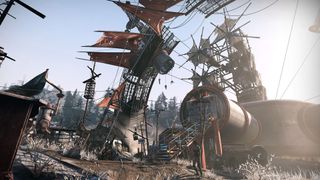
Any new Fallout game—particularly one as controversial and non-traditional as Fallout 76—comes overencumbered with baggage. The PC community especially is guilty of talking itself out of a good time by lionising earlier entries like New Vegas at the expense of Bethesda Game Studios’ own efforts. Here’s the thing: there’s more New Vegas in 76 than almost any other game out there. Its newer questlines go harder on dialogue skillchecks and branching options than Fallout 4, and the political scuffles between factions on the Atlantic City boardwalk are knotty and inventive.
Fallout 76 is also unexpectedly dedicated to lore from Black Isle’s Fallout games in the '90s. As a prequel, it’s well placed to dig into the earliest days of the Brotherhood and West Tek’s creation of the super mutants. Meanwhile, West Virginia’s proximity to DC means there’s plenty of Enclave skullduggery to uncover and disapprove of, much of it baked into Appalachia’s real history of congressional escape hatches.
Those who value open-ended RPG decision-making and prose above all else might be better served by turning their back on the Fallout series and embracing the likes of Geneforge 2 instead. But if you’ve ever loved a first-person game in a Bethesda engine with a sprinkling of sardonic humour, then head down what’s left of the Interstate 64. West Virginia welcomes careful drivers.
Most Popular


